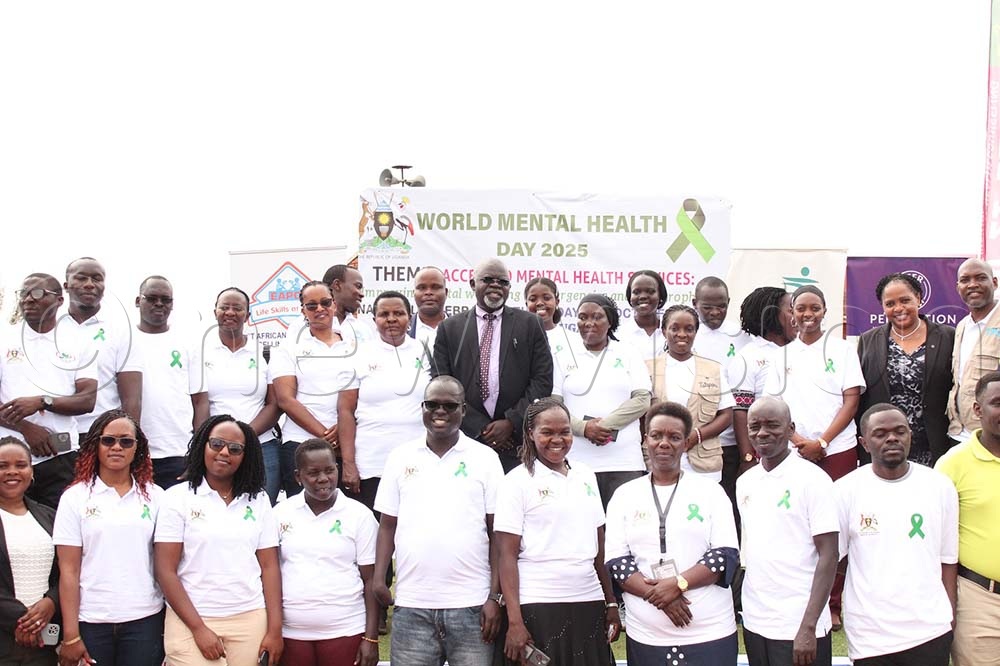Uganda marks Mental Health Day as Kiteezi residents recount garbage slide trauma
“Mental health cuts across all ages. So, we need to speak out because it leads to treatment. We would love to establish many mental health corners in health facilities, but our capacity and number of health workers remain limited,” Lukwata said.
Some of the Kiteezi massive garbage sludge landfill survivors during the commemoration of Mental Health Day. (Credit: Bridget Ahurira)
WAKISO - The Wakiso district-based Kiteezi community says it is still grappling with the emotional impact of the landfill collapse that occurred in early August 2024.
The tragedy took over 30 lives, left dozens injured and displaced thousands of families. However, while many of the physical wounds have healed, the mental and emotional scars remain deep.
Recognising this silent suffering, the health ministry chose Kiteezi as the venue for this year’s World Mental Health Day under the theme: Access to Mental Health Services: Improving Mental Wellbeing in Emergencies and Catastrophes.
Representing director of public health and health services, Dr Daniel Kyabayinze, was health services commissioner, Dr Alfred Driwale, who said: Conflicts, disasters, and health emergencies take a heavy toll on mental health. Investing in mental health is investing in recovery. It strengthens families, rebuilds communities, and revitalises economies.
Driwale added that the theme is timely and relevant, especially here in Kiteezi, a community that has experienced the devastating effects of disaster.
"Such experiences remind us that emergencies and catastrophes not only destroy homes and livelihoods; they also leave deep psychological wounds that may take years to heal".
The ministry highlighted ongoing efforts to integrate mental health and psychosocial support (MHPSS) into emergency response systems.
These include building the capacity of frontline health workers, adapting mental health service packages for crisis settings, and embedding MHPSS within the national Incident Management Framework.
Representatives from different partners and ministries at the commemoration of Mental Health Day, as Kiteezi residents recounted garbage slide trauma. (Credit: Bridget Ahurira)
Dr Hasfa Lukwata, the ministry commissioner for mental health, highlighted that mental health affects all ages and must be prioritised, especially in disaster-affected communities.
“Mental health cuts across all ages. So, we need to speak out because it leads to treatment. We would love to establish many mental health corners in health facilities, but our capacity and number of health workers remain limited,” Lukwata said.
Psychological scars
Among the survivors still struggling are Fred Mutaawe, Joshua Ariho and Charles Kabunga, whose stories reveal the enduring psychological scars left by the disaster.
Mutaawe, a father who narrowly escaped death when garbage crashed through his home, said: I was inside the house when the tragedy happened. I lost everything: My home, my chickens, my income. The Government gave us shillings two million for rent, but it is all finished. Landlords are evicting us, and school fees are a problem. We have nothing.”
For Ariho, the tragedy was intensely too much; he lost both his wife and child in the disaster.
“My mother-in-law is mentally unstable; she is no longer in her right senses because her daughter had promised to return with a vehicle. So, whenever she sees a car, she runs after it shouting, ‘My daughter is here,’” he said, his voice trembling.
Kabunga faces a similar struggle.
“I lost two of my children, one in Senior Six and the other in Senior Five. They used to ride their bicycles every morning from home to Kololo Secondary School in Kampala and return home in the evening. Now, whenever I see students on bicycles, I feel like I’m seeing my children again," he recalled.
Kabunga described the toll on his mental well-being. "Sometimes I feel I should have died with them. I’m struggling with thoughts. I often forget things easily, and sometimes I just wander around aimlessly until community members come to find me. When they try to help, I end up throwing tantrums at them".
“For survivors like us, recognition is long overdue. We are urging the Government and KCCA to understand that we are not criminals. This tragedy happened because of negligence. We just want to rebuild our lives," Kabunga added.
The commemoration, held on October 31, 2025, at Kiteezi Church of Uganda, ended with a call for stronger collaboration among government agencies, development partners and local authorities to ensure mental health services reach those most affected.